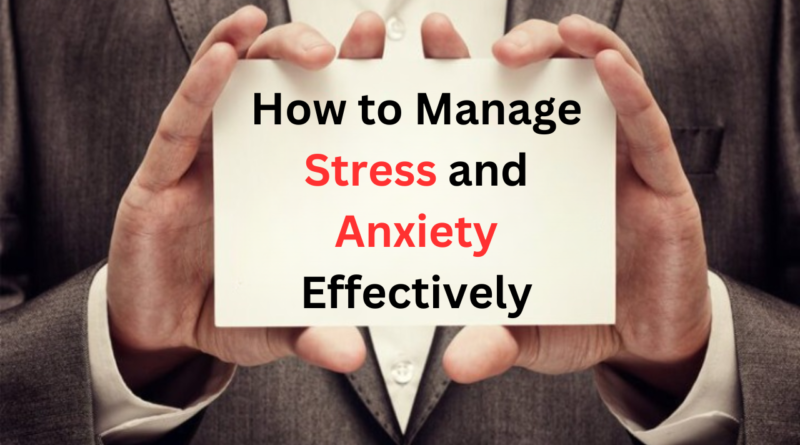How to Manage Stress and Anxiety Effectively:
Stress and anxiety have become common problems that millions of people deal with daily in today’s fast-paced world. Stress can hurt one’s mental and physical health whether it originates from work interpersonal relationships or the pressure to achieve. Tension fear or unease can be the enduring signs of anxiety which is frequently associated with stress. Keeping these feelings under control is crucial to living a balanced life. Here are some useful techniques to aid in the efficient management of stress and anxiety.
1. Identify the Root Cause:
Determining the source of one’s stress and anxiety is a crucial first step towards managing them. Stressors may originate from within (e.g. G. self-imposed standards) or outside (e.g. G. work deadlines). Commence by jotting down the circumstances or factors that set off tension or anxiety. Identifying the underlying cause will assist you in creating focused remedies. It’s simpler to either stay away from stressful situations or get ready for them with coping mechanisms once you know what makes you anxious.
2. Practice Mindfulness and Meditation:
An effective strategy for reducing stress and anxiety is mindfulness. Focusing on the here and now without passing judgment is the practice of mindfulness which keeps you rooted. Your mind can be calmed greatly by using methods like progressive muscle relaxation guided imagery and deep breathing. Even just ten minutes a day of meditation can help to reduce negative thoughts and promote clarity and calm.
How to Practice:
- Find a quiet spot where you won’t be disturbed.
- Close your eyes and take deep breaths.
- Focus on your breath, letting go of distracting thoughts.
The beauty of mindfulness and meditation is that they can be practiced anywhere during a lunch break before a meeting or even on the commute to work.
3. Exercise Regularly:
One effective way to lower stress and anxiety is to engage in physical activity. Endorphins are natural painkillers and mood enhancers that are released into the brain during exercise. Regular exercise such as yoga walking or even a quick 30-minute jog helps lower the body’s stress hormones such as cortisol and adrenaline.
Tips for Starting:
- Choose an activity you enjoy it could be dancing, cycling, or hiking.
- Set realistic goals aim for 30 minutes of exercise at least three to five times a week.
- Gradually increase your activity level.
Exercise also promotes better sleep, which is crucial for managing stress and anxiety.
4. Establish a Healthy Routine:
Establishing a daily routine can help people feel more in control and less stressed. You can efficiently plan your day and avoid last-minute rush and uncertainty when it is well-structured. Allocate time for work rest self-care and sleep.
Here’s How to Build a Healthy Routine:
- Sleep: Aim for 7-9 hours of sleep each night. A good night’s rest recharges your mind and body.
- Nutrition: Eat a balanced diet, rich in fruits, vegetables, and whole grains. Avoid excessive caffeine, sugar, and processed foods, which can contribute to anxiety.
- Breaks: Take regular breaks to avoid burnout, especially when working for long hours.
A balanced routine not only promotes physical health but also helps in creating a stable mental state.
5. Set Boundaries and Say No:
It is acceptable to refuse requests occasionally. Overcommitting causes overwhelm which in turn fuels tension and anxiety. Establishing healthy boundaries aids in keeping you in charge of your time and energy whether at work or in personal relationships.
How to Set Boundaries:
- Be honest about your capacity. If you’re already swamped with tasks, don’t be afraid to decline new ones.
- Communicate clearly with people. Explain your limitations without guilt.
- Prioritize activities that bring you joy and fulfillment.
Recall that prioritizing yourself when necessary is not a sign of selfishness. Making your mental health a priority ought to be your main priority.
6. Talk to Someone:
Speaking with a trusted person about your feelings can offer you emotional support as well as a fresh viewpoint on your circumstances. Expressing your ideas to someone be it a close friend member of your family or a qualified counselor lessens the load and aids in problem-solving.
It is crucial to get assistance from a therapist or counselor if stress and anxiety worsen and start to affect your day-to-day activities. They can provide you direction and strategies that are suited to your needs such as Cognitive Behavioral Therapy (CBT) which has been proven to be very successful in treating anxiety.
7. Use Stress-Relief Techniques:
You can include several stress-reduction strategies in your everyday routine:
- Deep Breathing: Simple deep breathing exercises can instantly calm your nerves. Inhale deeply, hold for a few seconds and exhale slowly. Repeat this for a few minutes to lower your heart rate and relax your muscles.
- Progressive Muscle Relaxation (PMR): This involves tensing and then slowly releasing different muscle groups in your body. It helps reduce the physical tension associated with stress.
- Journaling: You can use a variety of stress-reduction strategies in your everyday life such as:
8. Embrace Positive Self-Talk:
Our inner dialogue or how we talk to ourselves has a big impact on how we manage stress. While optimistic affirmations promote resilience negative self-talk increases anxiety. Take the place of ideas like “I can’t handle this” with “I will do my best, and that is enough.”
By consistently practicing positive self-talk, you can change the way you perceive challenges, viewing them as opportunities rather than obstacles.
Conclusion:
Managing stress and anxiety takes conscious effort, but with the right strategies, you can regain control over your emotions. Identifying the root cause, practicing mindfulness, exercising, setting boundaries, and embracing positive self-talk are powerful steps toward a healthier mind. It’s important to remember that everyone experiences stress, but how we manage it defines our overall well-being. Incorporating these techniques into your life can significantly improve your mental and emotional health, helping you lead a more balanced and fulfilled life.
